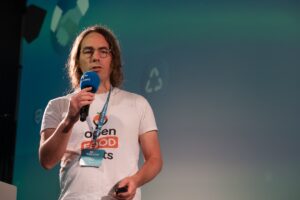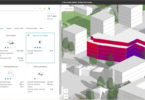As anyone interested in climate change knows, the internet lies at the heart of efforts to combat the problem. From campaigning on social media, using apps to make informed choices, or accessing data to look for trends, it is the backbone of climate action. For this reason, we virtually attended the Next Generation Internet forum held on November 15-16th, 2023, which suggested how the internet of the future should take shape for the benefit of all.
At the fifth annual forum, a number of insightful decision makers, innovators, and technology influencers put forward the European vision for an open internet. It is a resource that should be shared by all rather than subject to monopolies on technology and information. Many of the technological and ethical trends discussed hold great relevance for the climate change debate, from large organisations developing environmentally-friendly digital approaches down to activists building grassroots support.
Some of the topics covered included the idea of an internet built on open-source technology and a ‘digital commons’ of information owned and accessed by all. Other topics included cybersecurity, which is important for organisations of all sizes, and some new ideas for open social media and open databases. These could all become important components of the Next Generation Internet.
What is the Next Generation Internet?
As an initiative of the European Commission, The Next Generation Internet (NGI) lays out a new direction for the internet in Europe and further afield. Building upon the principles adopted in the European Declaration on Digital Rights and Principles, the NGI focuses on a shared internet developed for the benefit of all rather than a system constrained by profit motives and the hoarding of technology and intellectual property.
To achieve this, open-source technology, access to common information, and new ways of democratizing cyberspace could become agents for change. The idea of openness and sharing in a federated, digital future fits into the European Commission’s vision of empowering individuals and breaking down the present barriers that often focus on the larger players.
What Does it Mean for Climate Change?
The NGI forum contained a number of suggestions that could influence people and organisations working to raise awareness about climate change and the environment. Environmental issues are one area where the open flow of information, lack of censorship, and level playing field offered by open-source tools can make a huge difference.
Many climate change movements operate at the grass roots without the funding or expertise to access expensive or complex technologies. Most also lack the ability to access, store, and analyse large volumes of data. Accordingly, an open NGI intended to serve the people is an intriguing idea that offers a boost to activists, NGOs, and small businesses wanting to make a difference. Open-source technology and encouraging digital commons will underpin this shift in philosophy to a more democratic and environmentally-friendly internet.
Open Source and Digital Commons
For many organisations, especially those struggling for funds, open-source software has changed the landscape. Now, developing apps, software, and new technologies is possible with smaller budgets, empowering small groups to take meaningful action and start social movements. This is especially important for climate change organisations with restricted funds, where open-source software is often the only choice.
In the same way, the idea of a digital commons with shared repositories of information is a potential tool for promoting the environment. Many climate change activists and organisations dig deeper into information, analysing data for trends and areas of concern. With a shared pool of resources, especially information from public bodies, this will become much easier to source, analyse, and publish. Open databases also empower citizens and consumers to make ethical choices based on health and the environment.

In his presentation, Alexandre Garel, of the Open Food Facts Project, pointed out a number of problems with the food we eat. Food can lead to obesity and a range of health problems alongside environmental impacts such as greenhouse gas emissions and high water usage. Accordingly, the Open Food Facts database empowers consumers, researchers, and policymakers to change the impact of food on health and planet.
Crowd-sourced and available on an app, the database offers the nutri-score, eco-score, and other nutritional and environmental information about individual food products, helping consumers make informed choices. Alongside environmental information, users can look for information about health and allergies alongside religious diet and other ethical considerations. The database provides a private, personalised score for each person through the app or on the web.
The database can be shared freely and allows researchers and policymakers to access data that allows them to track specific properties, while NGOs, researchers, and journalists can establish facts. At present, the database holds 2.8 million food products in 160 countries, has 2.9 million regular users, 20,000 contributors, and is reused by over 200 apps.

The open social media could be particularly important for climate change activists, for whom social media publicity is one of the most important tools. Many climate change activists claim that large tech corporations running social media engage in censorship of divergent views, pushing them down the agenda. One way of tackling this is with an open social media that provides a true ‘public marketplace’ for sharing views and publicising causes.
Pouhiou Lafon Roudier of Framasoft pointed to PeerTube, a democratic video hosting site that helps educators and streamers move away from the advert-dominated commercial video sites. These often try to maximise potential revenue rather than valuing quality of information, so a federalised framework may be a powerful resource for videos providing information about climate change and other environmental issues.
App Development
Many organisations and groups involved in climate and the environment are developing apps to help spread a message and provide people with information and tools. Again, because these can be complex and expensive to develop, open-source options can make the difference.
Daniel Thompson-Yvetot discussed Tauri, an OS toolkit used to make apps. It is streamlined and, by optimising the data downloaded, reduces the energy used and the strain on the environment. Tauri is also useful for helping small developers develop the right mindset to consider cybersecurity at all stages, with a security-audited framework to help them comply with legislation and minimize vulnerabilities.
Cybersecurity for Climate Change Organisations
As Daniel noted, open-source principles raise the issue of cybersecurity and protecting data. Now, even the smallest organisation needs to look at cybersecurity to prevent damage to systems but also to protect data given the trend within the EU towards stringent protections for personal details. Even a small climate organisation holding personal information about members needs to consider security and data protection, so it is good to see the NGI Forum emphasising this.
Building the Internet of the Future
The NGI forum’s series of talks and workshops was illuminating for anyone interested in the future of the internet and whether it can regain its ethos of equality, openness, and a level playing field. For climate change organisations, the shift towards an open model with room for community action, shared resources, and access to information sounds very appealing.







